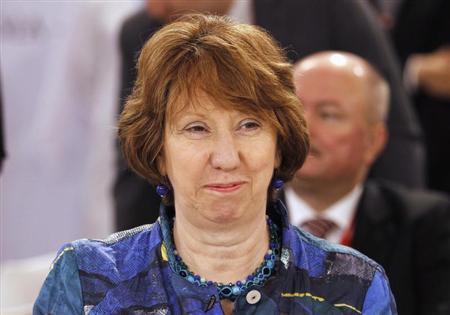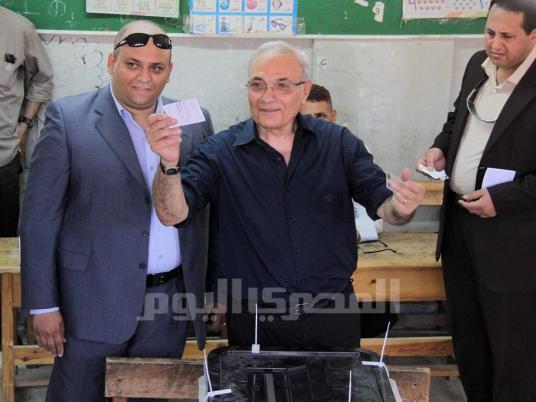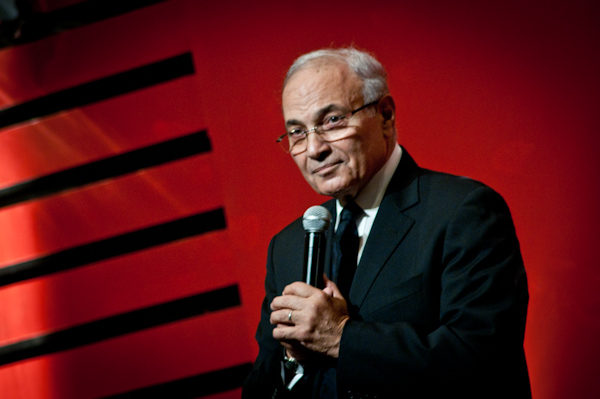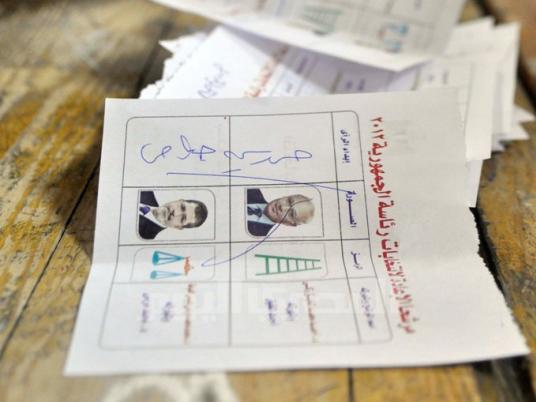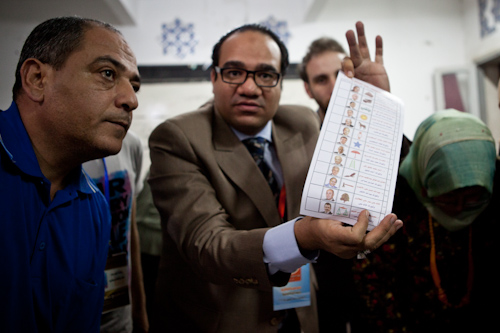
Al-Masry Al-Youm has compiled a comprehensive tabulation of results from the first round of presidential elections, which ended yesterday.
The Muslim Brotherhood’s candidate, Mohamed Morsy, looks set to lead Egypt's first presidential election poll following the uprising that deposed Hosni Mubarak last year, taking 5,446,460, or 24.9 percent of the votes. Ahmed Shafiq, a former civil aviation minister under Mubarak who was appointed during the president’s last days in office as prime minister, is a close second, with 5,338,285, or 24.5 percent of the votes. Nasserist candidate Hamdeen Sabbahi has surprised many observers by coming in third, with 4,616,937, or 21.1 percent of the votes. Abdel Moneim Abouel Fotouh, moderate Islamist and former Muslim Brotherhood member, was fourth with 3,889,195 or 17.8 percent of the votes. Amr Moussa, former secretary general of the Arab League and diplomat, came in fifth with 2,471,559, or 11.3 percent.
The results were obtained by Al-Masry Al-Youm reporters in 27 governorates, following up on results from 13,000 polling stations. According to Al-Masry Al-Youm's calculations, overall turnout throughout the country was 43.3 percent, lower than many had expected going into the historic election.
Official results will not be announced by the Presidential Election Commission, a committee of senior judges whose opinions cannot be appealed, for at least two more days. A runoff vote between the two leading candidates will take place on 16 and 17 June.
Sabbahi garnered the single highest voters' percentage in one city, riding a wave of last-minute popular support. He dominated Kafr al-Sheikh, his hometown, where 63 percent voted for him.
Morsy’s greatest success came in Fayoum, where 48 percent of voters supported him. Shafiq’s did the best in Monufiya Governorate, where 53 percent voted for him. Abouel Fotouh had the highest number of voters in Matrouh Govnorate with 51 percent of the ballots cast for him. Moussa’s territory was South Sinai where 29 percent of voters opted for him.
In Cairo, where 12.8 percent voters live, Sabbahi won 29 percent of the vote, followed by Shafiq (27 percent), Morsy (17 percent), Abouel Fotouh (16 percent) and Moussa (11 percent). In Giza, the second largest governorate with 8.4 percent of total voters nationwide, Morsy led with 29 percent of the votes, followed by Sabbahi and Shafiq, both at 21 percent, and Abouel Fotouh at 19 percent. Moussa won 11 percent of the votes.
Voter turnout in Port Said was the highest at 60 percent, followed by Alexandria with 54 percent. Turnout in Cairo, Damietta and Suez was 53 percent. The Delta had a high turnout with 49 percent voting in Monufiya, 48 percent in Sharqiya. In Daqahliya and Gharbiya, turnout was 45 percent. In Beni Suef, south of Cairo, it was 43 percent. In Kafr al-Sheikh turnout was 42 percent and in Beheira it was 41 percent. Upper Egypt had a lower turnout with 39 percent voting in Fayoum, 35 percent in Assiut, 33 percent in Sohag, 30 percent in Aswan and 29 percent in Luxor.
Qena witnessed the lowest turnout, at 25 percent.
The results also demonstrate a shift from traditional voting patterns. By and large, Shafiq was more successful in the Delta, typically a Brotherhood stronghold, while Morsy dominated in Upper Egypt, usually thought to support the National Democratic Party, the now dissolved party of Mubarak of which Shafiq was a member.
In Daqahlia, Shafiq led, followed by Sabbahi and Morsy in the same ranking, then Abouel Fotouh, then Moussa. Even in Sharqiya, Morsy’s hometown, he came second after Shafiq, followed by Sabbahi, Abouel Fotouh and Moussa. In Qalyubia, Shafiq led, followed by Morsy, Sabbahi, Moussa and Abouel Fotouh. And in In Gharbiya, it was Shafiq first, followed by Sabbahi, Morsy, Abouel Fotouh and Moussa. Luxor differed from its Upper Egyptian neighbors and supported Shafiq, followed by Morsy, Abouel Fotouh, Moussa and Sabbahi.
In Monufiya, the hometown of former President Hosni Mubarak, Shafiq also came in first, followed by Morsy, Abouel Fotouh, Sabbahi and Moussa.
Morsy seemed to have deep inroads in Upper Egypt.In Minya, Morsy led, followed by Shafiq, Abouel Fotouh, Sabbahi and Moussa. And in Sohag, Morsy also won, followed by Shafiq, Abouel Fotouh, Moussa and Sabbahi. In Assiut, it was Morsy again, followed by Shafiq, Abouel Fotouh, Sabbahi and Moussa. Morsy was also first in Fayoum, followed by Abouel Fotouh, Shafiq, Sabbahi and Moussa. In Aswan, Morsy and Moussa tied for the lead, followed by Shafiq and Abouel Fotouh both and Sabbahi came in last. The Brotherhood leader also took the vote in the In the New Valley, followed by Abouel Fotouh, then Moussa, then Sabbahi and then Shafiq.
Outside of Upper Egypt, Morsy took Ismailia, Beni Suef, Suez, and North Sinai. In Ismailia, Morsy led, followed by Sabbahi, then Moussa, Abouel Fotouh and Shafiq. In Beni Suef, the most voters chose Morsy, followed equally by Abouel Fotouh and Shafiq, then Moussa, then Sabbahi. In North Sinai it was Morsy first, Abouel Fotouh second, Shafiq third, and Sabbahi fourth. In Suez, Morsy led, followed by Sabbahi, Moussa, Abouel Fotouh and Shafiq
The voting, in some cases, seemed to differ between urban and rural settings, Sabbahi was much more successful in Cairo and Alexandria, less so far from the population centers. This likely contributed to surprise felt by many in the capitol at Shafiq's strong showing.
In Port Said, Sabbahi led, followed by Shafiq, Morsy and Abouel Fotouh. In Kafr al-Sheikh, Sabbahi’s hometown, he also had the strongest showing, followed by Morsy, Abouel Fotouh, Shafiq and Moussa.
Moderate Islamist Abouel Fotouh was most successful in a few mid-sized cities throughout the country. In Qena, Abouel Fotouh led, followed by Morsy, Shafiq, Moussa and Sabbahi. He also led in Damietta, followed by both Morsy and Sabbahi, then Moussa. For once in Damietta, Shafiq came last.
In Matrouh, Abouel Fotouh also led, followed by Morsy, then Moussa and in last, Sabbahi and Shafiq together.
As for Moussa, his extensive campaigning throughout the country in past months seemed to have little effect on voters. The South Sinai was the only place where Moussa led, followed by Morsy, then Abouel Fotouh, then Shafiq, and then Sabbahi .

